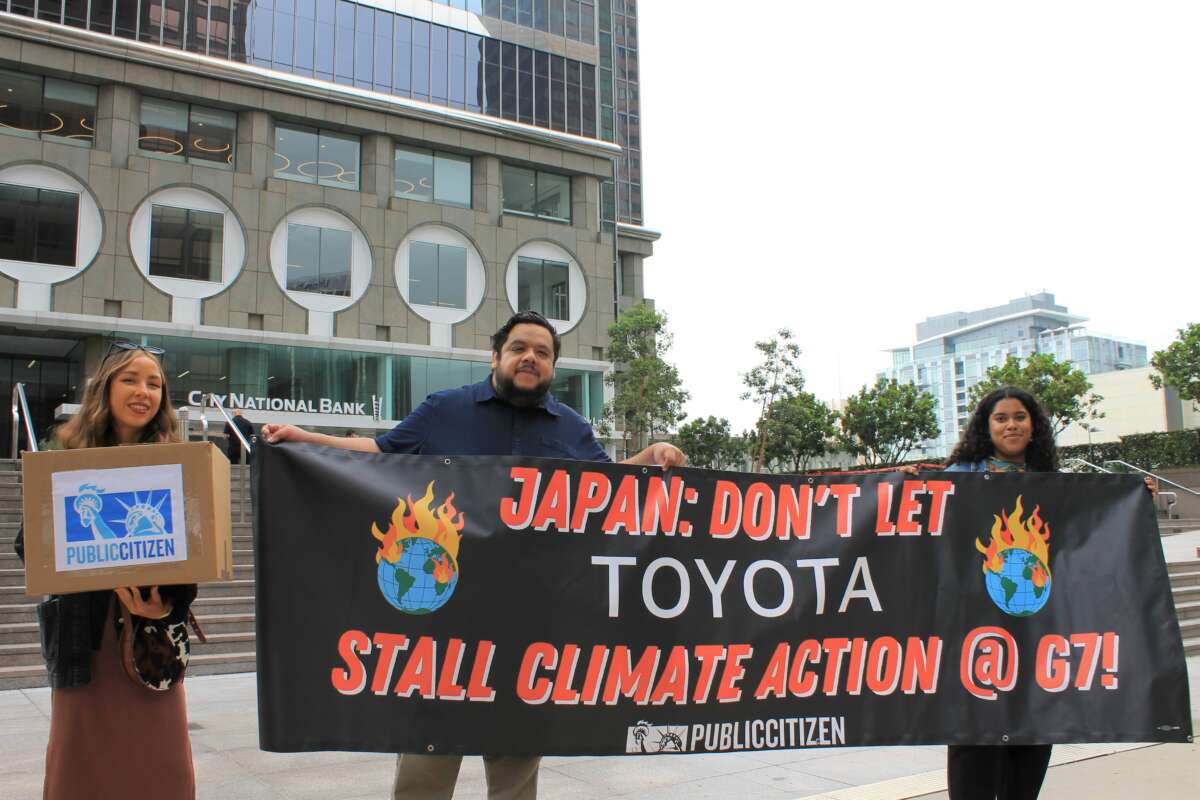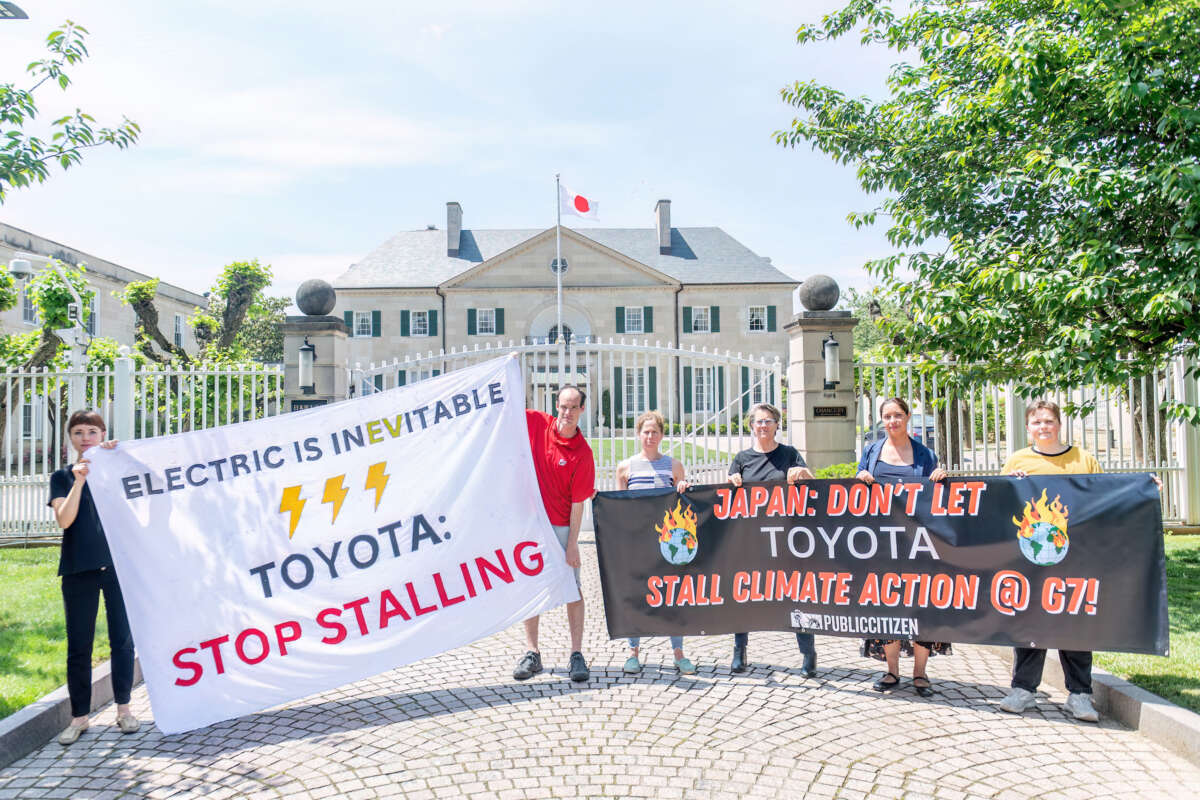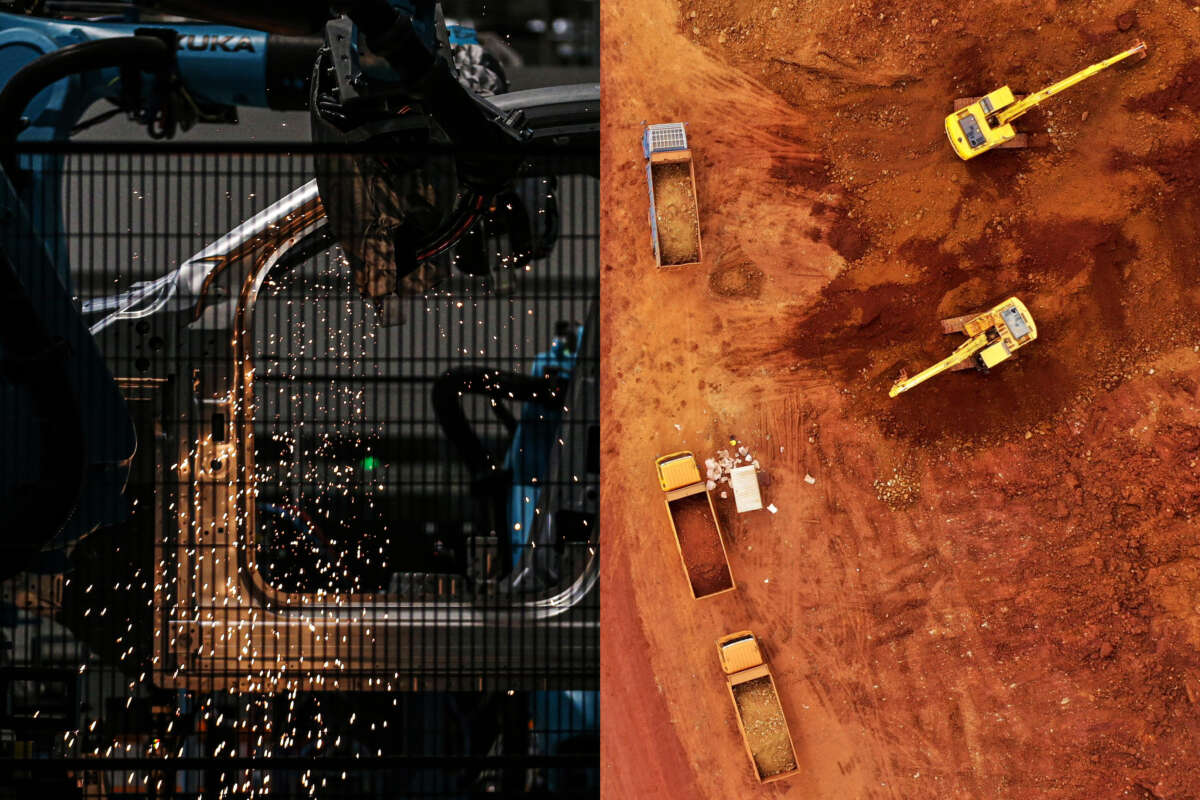A global boom in the production of electric vehicles (EVs) propelled by battery power instead of internal combustion engines is imminent. Worldwide, around 14 percent of all new cars sold in 2022 were electric, up from less than 5 percent in 2020. In the U.S., electric car sales increased from 0.2 percent in 2011 to 4.6 percent in 2021, and then jumped to 8 percent in 2022. Analysts predict that number could rise to 40 percent or more by 2030.
But the shift away from fossil fuel-powered vehicles, while broadly welcome, raises numerous other questions about the production process behind EVs.
For instance, will the carbon-intensive production of the steel that makes electric vehicles also be decarbonized? Will the rights of Indigenous communities disproportionately impacted by the extraction of critical minerals be respected, including their prerogative to withhold consent around mining projects? Will new jobs respect the rights of workers, including their right to organize into unions?
Earlier this year, a new network called Lead the Charge, comprised of several advocacy organizations, came together to address these concerns and pressure automakers to account for climate and environmental justice, labor and Indigenous rights issues. The goal is to ensure that, from the beginning, the world-defining transition to EVs will accelerate a categorical shift away from climate-destroying fossil fuels and advance goals around basic rights, especially for Indigenous communities and workers.
By focusing on automakers, whose decisions hold immense leverage over the future of crucial global supply chains, Lead the Charge hopes to advance a just and fossil-free future across the entire supply chain — not just around what comes out of exhaust pipes.
“We want to make sure that the transition is not just shifting tailpipe emissions to other emissions and abuses throughout the production side of the supply chain or exacerbating existing issues,” said Erika Thi Patterson, auto supply chain campaign director for Public Citizen’s Climate Program.
In addition to Public Citizen, members of Lead the Charge include the Sunrise Project, Mighty Earth, First Peoples Worldwide, Cultural Survival, Sierra Club, and other groups.
Lead the Charge
Simply put, there’s no way to address the climate crisis without decarbonizing auto transportation. Passenger vehicles account for around 15 percent of all greenhouse gas emissions globally.
Of course, this means moving away from vehicles powered by burning fossil fuel and toward transportation run on fossil-free energy sources. But when it comes to more fully decarbonizing the total emissions released by automobiles and advancing a just transition, that’s just a start.
Electric vehicles are the final link in a vast global supply chain that currently involves the carbon-intensive production of raw materials like steel and aluminum that contribute enormously to global warming, as well as mining that involves practices that often run roughshod over the rights of Indigenous people and workers. According to one report, the manufacturing and supply chain for EVs must reduce greenhouse gas emissions by 81 percent by 2032 to keep at the 1.5 degrees Celsius Paris Agreement goal.
This makes auto supply chains more than sequential lines of production whose end results are vehicles. Rather, they are sites where the battle for climate, racial and economic justice is playing out, making them crucial organizing spaces for anyone who cares about equality, rights and sustainability.
Automakers sell around 80 million cars a year globally. Their production needs to structure entire global supply chains. Steel, for example, makes up more than half of the average vehicle. This gives automakers immense leverage to set terms for purchasing requirements within those supply chains.
For the Lead the Charge campaign, this all adds up to a sense of urgency, not merely to push slow-moving auto giants to ditch fossil fuel-powered vehicles more quickly, but to ensure that, amid a once-in-a-lifetime transition to a new world of electric vehicles, the emerging supply chains respect and protect Indigenous and worker rights, and show a commitment to decarbonization that goes beyond only tailpipe emissions.
The problems in the current auto supply chain are multiple, says the campaign.
The materials that go into auto production — aluminum, steel, batteries — are themselves the end products of production chains with huge carbon footprints. The steel sector, for example, is behind 8 to 11 percent of annual global greenhouse gas emissions, and its production relies heavily on coal-fired energy.
“When mining companies come to the territories of Indigenous people … the resources leave, without any or very little economic remuneration…. But of course, the environmental degradation stays.”
“Electric is really just the start,” said Matthew Groch, a senior director on heavy industry at Mighty Earth, a climate advocacy group and a member of the Lead the Charge network. He points out that steel and aluminum “make up 40 to 60 percent of embodied emissions for motor vehicles.”
“We’ve had conversations with automakers,” says Groch, “where steel and aluminum decarbonization in their supply chain just isn’t something they’re even considering.” (Mighty Earth and Public Citizen have taken action calling on steelmakers to move toward green steel that relies on decarbonized production.)
Moreover, the reliance on mineral extraction — lithium, nickel and cobalt, for example — clashes with Indigenous rights because vast amounts of mineral deposits are located on or near Indigenous lands. The global auto chain also has a checkered record on workers’ and human rights.
With all this, Lead the Charge is making three core demands around how future automobiles should be produced: equitably, with a respect for Indigenous rights, workers and local communities; sustainably, with a commitment to upholding environmental health and biodiversity through the supply chain; and fossil-free, meaning “100% electric and made with a fossil fuel-free supply chain.”
To illustrate their view on how most auto companies are faring — or failing — on these goals, Lead the Charge released a scorecard earlier this year — featured in a Washington Post guide for buying electric vehicles — that rates 18 automakers on a range of metrics tied to “commitments, progress, and concrete action” toward fossil-free and environmentally sustainable supply chains and in upholding Indigenous and workers’ rights across supply chains.
Many of the scorecard results are very low. Scores are weighted toward indications toward “implementation” over mere gestures or promises. (For more details on both of these, see the scorecard’s methodology section.)
“The Industry’s Biggest Climate Laggard”
One of the lower-scoring companies is Toyota, the world’s second-biggest automaker.
This might surprise some readers. Afterall, Toyota is well-known for its hybrid Prius, long imagined as a greener alternative to entirely gas-powered cars. But campaigners with the Lead the Charge say Toyota’s association with sustainability is sorely outdated.
“While many other companies have come out with new EV technologies, Toyota has continued to double down on their investments in hybrid technology,” said Thi Patterson.
“Because they’ve invested so much in their hybrid technology, they’re trying to prolong the transition to EVs,” she said, noting that customers are “often unaware that there are cleaner, zero-emission options out there.”
Toyota scored a dismal 6 percent on the Lead the Charge scorecard.
“Toyota continues to be the industry’s biggest climate laggard,” says Lead the Charge. “It’s among several automakers that have made the least progress on the EV transition: Battery-powered electric vehicles comprised less than 1% of the company’s total sales in 2022.”
All this has significant repercussions. As one of the giants of the global auto industry, Thi Patterson says that what Toyota does can have “tremendous influence over global supply chains.”
Moreover, she says, Toyota is a major anti-climate lobbying group. According to the nonprofit think tank Influence Map, Toyota, despite its green messaging, has had “mostly negative engagement globally on policy mandating the full electrification of the automotive sector.” For example, Toyota has opposed or “appeared to oppose” national policies to phase out internal combustion engines in Canada, the U.K., Japan, New Zealand and California, according to Influence Map, and it did not sign on to a 2021 pledge by several major automakers to phase out internal combustion engine-powered vehicles in leading markets by 2035 and globally by 2040.
Public Citizen and other groups are stepping up the pressure on Toyota, which has a new CEO and is facing growing pressure from investors around climate issues. They sent a March 30 letter to the company demanding that it “phase out internal combustion engine vehicles (including hybrids and plug-in hybrids) in the U.S. and Europe by 2030 and globally by 2035” and that it “require 100% renewable energy use throughout [its] supply chains globally by 2035.”
A week later, Toyota announced an update to its EV buildout strategy, saying it aims to sell 1.5 million battery electric vehicles annually by 2026. Public Citizen called it “a modest improvement for an auto giant that lobbied for decades to delay the EV transition,” and “a mere baby step considering the price we will pay for Toyota’s failure to fully reverse course on the internal combustion engine.”


“Our Fundamental Right of Self-Determination”
One of the lowest-scoring areas among all automakers analyzed by Lead the Charge was around Indigenous rights. Indeed, two-thirds of all 18 automakers scored a zero in this area.
This is alarming, several Lead the Charge partners told Truthout, since Indigenous communities are disproportionately impacted by the shift to EVs, and specifically the transition’s reliance on mining critical minerals needed to make vehicle batteries.
One new study estimates that, among 30 “energy transition minerals and metals” that “form the material base for the energy transition,” more than half of this resource base globally “is located on or near the lands of Indigenous and peasant peoples.” Another study finds that within the U.S., “97% of nickel, 89% of copper, 79% of lithium and 68% of cobalt reserves and resources” — all critical energy-transition minerals — “are located within 35 miles of Native American reservations.”
Kate Finn is the executive director of First Peoples Worldwide, which is part of the Lead the Charge network. A member of the Osage Nation, Finn has written extensively on violations of Indigenous rights by extractive industries mining for energy-transition minerals.
“Indigenous peoples in the U.S. have engaged with mining companies for 400 years,” she told Truthout. “It’s not new what happens when mining companies come to the territories of Indigenous people. Indigenous leaders are often not even consulted about what happens on their lands, and then the resources leave, without any or very little economic remuneration,” Finn said.
“But of course, the environmental degradation stays,” she said.
However, Finn says, “we have an opportunity now to not repeat this pattern in the green economy.”
To this end, a key demand of Lead the Charge is that automakers uphold Indigenous rights and self-determination by honoring the processing of Free, Prior and Informed Consent (FPIC).
Spelled out in the UN Declaration on the Rights of Indigenous Peoples, FPIC posits that Indigenous communities have the right to grant or withhold consent around projects that impact their land and resources, and that this decision should come after a substantive, prior period of consultation and dialogue. Indigenous communities can also negotiate the terms of approval for any project and withdraw their consent at any time.
Ultimately, FPIC is a mechanism to protect Indigenous self-determination.
Finn calls FPIC “the global consensus on minimum standards to respect the rights and well-being of Indigenous peoples globally” and “the safeguard of a whole basket of rights” for over 5,000 different Indigenous entities around the world.
Galina Angarova, the executive director of the Indigenous-led nonprofit Cultural Survival and a member of the Buryat people, the largest Indigenous group in Siberia, calls FPIC “a very specific right of Indigenous peoples that flows from our fundamental right of self-determination.”
Cultural Survival is also a Lead the Charge partner, and both Angarova and Finn are leaders in the Securing Indigenous Peoples’ Rights in the Green Economy (SIRGE) Coalition, which helped shape the Indigenous rights’ focus within Lead the Charge.
Angarova says the SIRGE Coalition formed after the Nornickel disaster of 2020 that spilled 21,000 tons of diesel into the Arctic subsoil and waters of a western Siberian region occupied by several Indigenous groups. The spill decimated water and fishing sources and hunting grounds. In the disaster’s aftermath, several groups came together to advance FPIC with private sector and governmental actors and, more broadly, to foreground Indigenous rights, self-determination and leadership in the green transition.
Angarova says the SIRGE Coalition’s goal is ensure that Free, Prior and Informed Consent is “implemented throughout the supply chain for the green economy, from the exploratory stages, to the end of the cycle, the product.”
“Unfortunately,” she says, “the initial Lead the Charge scorecard showed that, across the board, automakers are generally failing to incorporate Free, Prior and Informed Consent and Indigenous rights into their policies and to implement the practice.”
Some have raised frustrations with how corporations can approach FPIC — for example, treating it as one-way pro forma “information sharing” that glosses over Indigenous input and approval, a mere box to check before moving forward with a project.
Angarova stresses that “consultation does not equate to consent” under FPIC. Companies must have a “social license to operate” that can only be granted through the substantive and informed permission of Indigenous communities prior to the beginning of any operations.
She says that even when different actors warm up to FPIC, ensuring enforcement can be “very difficult,” and that the coalition is strategizing about how to ensure accountability. She highlights a range of injustices occurring today — for example, with a new lithium mining deal between Lithium Americas and General Motors opposed by the People of Red Mountain in Nevada.
“Indigenous lands, territories and resources are under direct threat,” says Angarova, because of the booming demand for transition metals such as copper, nickel, cobalt and lithium.
“As the demand for these minerals increases, Indigenous peoples also want to see an end to the climate crisis,” she said. “But this needs to be achieved in a way that respects their rights.”
All this begs the question: In addition to decarbonizing the auto supply chain, might a just energy transition also involve expanding modes of transportation that rely less on extraction — whether fossil fuels or critical minerals — altogether?
A recent report from the Climate and Community Project argues that lithium demand could be significantly reduced without impeding the shift away from internal combustion engines through building out public transportation. A greater role for green industrial policy and public ownership of key infrastructure could allow for planning that’s less reliant on mining the world’s critical energy-transition minerals.
Indeed, achieving a truly green and just transition will likely involve multiple and combined fronts.
Join us in defending the truth before it’s too late
The future of independent journalism is uncertain, and the consequences of losing it are too grave to ignore. To ensure Truthout remains safe, strong, and free, we need to raise $29,000 in the next 36 hours. Every dollar raised goes directly toward the costs of producing news you can trust.
Please give what you can — because by supporting us with a tax-deductible donation, you’re not just preserving a source of news, you’re helping to safeguard what’s left of our democracy.
